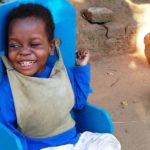Today there are over 700 million people on this planet living in “extreme poverty” (existing on less than $1.90 per day). Non-governmental organizations around the world have set a goal to end extreme poverty by 2030. Yet sadly, in Malawi the numbers of extreme poor have risen to 71% of the population (approximately 12 million Malawians).
The sheer number of people able to survive on less than $2 each day is staggering. More alarming are the choices that they must make on a daily basis.
There is more to global poverty than just numbers. USAID rightly describes extreme poverty as a “denial of basic freedoms and human dignity.” People living in extreme conditions face extreme choices between food, medicine, housing and education.
We saw the results of such a choice a few years ago. 
In 2014, Phoebe Kufeyani, MCM’s Social Director, visited a local village to assess a family situation after being tipped off by villagers. There she discovered Andrew Frank. At 4 years old, Andrew was left unattended in the small hut, placed in a pit dug by his mother. Phoebe found him rolling in the dirt. Andrew was unable to sit or stand on his own.
After arranging an examination it was discovered how bad things had become. Andrew was extremely malnourished, stunted in growth and developmentally delayed. He suffered from cerebral malaria two weeks after birth which caused brain damage.
What does a mother living in extreme poverty do? Does she risk not working in the fields to earn enough to care for the child? Does she stay with the child and risk starvation?
In Malawi there are few options for children with neuro-disabilities due to access to care and the cost to impoverished families. Mentally disadvantaged children are often discriminated against and denied education.
But at MCM our aim is that all orphans and vulnerable children have an opportunity to thrive. We see incredible possibilities for Andrew and decided to go to extreme measures.
Thanks to donor support and Phoebe’s oversight, Andrew receives physiotherapy three times a week in Blantyre (20 miles from his village). MCM also provides him with high protein foods such as milk, eggs, meat, and beans along with vegetables. He is showing progress in his motor skill, gaining weight and is now smiling!
Each month MCM spends approximately $80 for transportation, therapy and food supplements to give Andrew the opportunity.
Extreme poverty creates extreme risk. By understanding the risks involved and interceding through support services, we can provide local communities and the children we serve a chance to rise up out of poverty.
Learning about the extreme conditions orphans in Malawi face is only a first step. Stop and consider the possibilities. Even Andrew Frank has possibility, if we decide to give him a chance.
